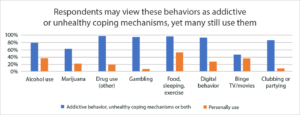From alcohol and drug use to gambling to restricted or binge eating, over three quarters of Americans surveyed report knowingly engaging at least one addictive behavior or unhealthy coping mechanisms.
The GeneSight Mental Health Monitor is a nationwide survey conducted online by ACUPOLL Precision Research, Inc. in February 2023 among a statistically representative sample (n=1000) of U.S. adults age 18+. The survey included a representative sample of adults diagnosed with depression and anxiety.
The survey found that 77% of Americans report using unhealthy behaviors to cope with mental health struggles. Additionally, 94% agreed that behavioral and substance addictions often mask underlying mental health issues. Even though they view these coping mechanisms as unhealthy or addictive, many still admit to using them. The survey also found that the unhealthy coping mechanisms people most readily engaged in included substance abuse such as drinking alcohol or consuming marijuana. However, many others also engaged in gambling, sleeping and eating too much or too little, excessive social media use, binging media, and partying.
Image Source: GeneSight
Those respondents diagnosed with depression and/or anxiety reported that they consider drinking alcohol alone as an unhealthy coping mechanism, addictive behavior, or both. Yet, 41% admitted to drinking alone to manage their mental health issues. Moreover, 25% of people who reported drinking heavily alone also admitted that they were worried they had a drinking problem.
“Mental health and addiction often go hand-in-hand,” said Morgan Freas, PharmD, a senior medical science liaison with Myriad Genetics. “Yet the stigma associated with admitting mental health challenges is often greater than escaping into substance or behavioral abuse.”
Medication trial and error
Two-thirds of those diagnosed with depression and/or anxiety reported experiencing trial and error when trying to find medications that work for them. Nearly half (45%) stated that they turned to unhealthy coping mechanisms as a result of medication error.
Those diagnosed with depression and/or anxiety admitted to using the following coping mechanisms:
- Sleeping too much or too little – 70%
- Withdrawing from social activities – 64%
- Binge watching media – 49%
- Skipping work/school/household responsibilities – 48%
Dawn Johnson, a psychiatric mental health nurse practitioner at the Indiana Center for Recovery in South Bend said, “Many of my patients have struggled with depression and/or anxiety but failed to find a treatment that made them feel better. So, they resorted to alcohol, drugs or destructive behaviors to sooth themselves, as these offered short-term relief.”
The survey found that of those who were told they have a problem, 58% of those diagnosed with depression and/or anxiety say mental health treatment helped relieve their addiction concerns.
Mental Health Trends
The GeneSight Mental Health Monitor also tracks depression/anxiety rates as well as factors driving mental health concerns and their impact on people’s lives. Comparing result data from Spring 2022 and Spring 2023, results show that more Americans are experiencing symptoms than last year. Issues such as cost of living (42%), relationships with family members and friends (36%), and inability to financially support their families (29%) are some of the top factors negatively impacting American’s mental health.
Other factors are:
- Body image – 25%
- Death of a close friend/family member – 20%
- Workplace performance/satisfaction – 16%
- What others think of me – 16%
- Dependence on alcohol or drugs – 13%
- Spread of COVID or another public health concern – 11%
- A medical diagnosis for myself or a loved one – 11%
Improving coping mechanisms
One way to improve healthy coping mechanisms is to enhance resilience. According to the American Psychological Association (APA), resilience is the process of adapting well in the face of adversity, trauma, threats or other significant sources of stress.
The APA suggests these strategies to build resilience:
Build your connections. Connecting with empathetic and understanding people can remind you that you’re not alone in the midst of difficulties. Focus on finding trustworthy and compassionate individuals who validate your feelings, which will support the skill of resilience. Along with one-on-one relationships, some people find that being active in civic groups, faith-based communities, or other local organizations provides social support and can help you reclaim hope. Research groups in your area that could offer a sense of purpose or joy when you need it.
Foster wellness. Promoting positive lifestyle factors like proper nutrition, ample sleep, hydration, and regular exercise is important. It can strengthen your body to adapt to stress and reduce the toll of emotions like anxiety or depression. Mindful journaling, yoga, and other spiritual practices like prayer or meditation can also help people build connections and restore hope, which can prime them to deal with situations that require resilience.
Find purpose. Volunteer with a local homeless shelter or simply support a friend in their own time of need. You can garner a sense of purpose, foster self-worth, connect with other people, and tangibly help others, all of which can empower you to grow in resilience. Develop some realistic goals. Do something regularly, even if it seems like a small accomplishment. Instead of focusing on tasks that seem unachievable, ask yourself, “What’s one thing I know I can accomplish today that helps me move in the direction I want to go?”
Embrace healthy thoughts. Accept that change is a part of life. Certain goals or ideals may no longer be attainable as a result of adverse situations in your life. Accepting circumstances that cannot be changed can help you focus on circumstances that you can alter. An optimistic outlook empowers you to expect that good things will happen to you. Try visualizing what you want, rather than worrying about what you fear. Along the way, note any subtle ways in which you start to feel better as you deal with difficult situations.



